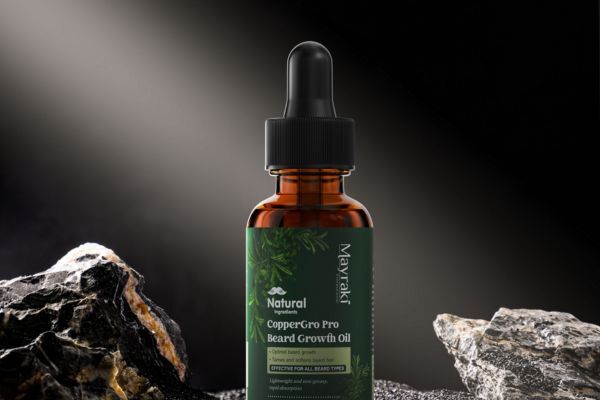The Connection Between Hormonal Changes and Beard Health
May 26, 2025 | By Maria Eliza Pineda

The health of your beard is closely related to your hormones, particularly testosterone and dihydrotestosterone (DHT). These hormones are primarily responsible for stimulating hair follicles on your face, which significantly impacts beard growth. If you're experiencing issues like patchy areas, slow growth, or thinning hair, it could be due to a hormonal imbalance. In this article, we'll discuss the hormones affecting your beard and how you can enhance facial hair development through proper hormonal support.
Why Hormones Are Key to Beard Health
Hormones play a crucial role in the health of your beard, especially testosterone and DHT. Testosterone triggers the growth of facial hair, while DHT plays a role in the actual growth process. However, when there's a hormonal imbalance, it can lead to problems with beard density, thickness, and growth speed. It's essential for men to understand how hormones affect their beard and how they can support it with natural solutions and products.
Which Hormones Affect Beard Growth?
Role of Testosterone
Testosterone is a key hormone that helps in the growth of facial hair. When testosterone levels are high, it boosts the activity of hair follicles on your face, causing new hair to sprout. However, if testosterone is low, it may result in slower beard growth or a lack of new hair in certain areas of the face. So, if you’re noticing slower or non-existent beard growth, a possible reason could be low testosterone levels in your body.
Impact of DHT
DHT, or dihydrotestosterone, is a byproduct of testosterone. It is what actually activates hair follicles on the face and body. When DHT levels are high, you're more likely to experience thicker, faster beard growth. However, if DHT levels are excessive, it can lead to side effects like hair loss on the scalp or even thinner facial hair. Therefore, maintaining a proper balance of DHT is crucial for keeping facial hair healthy.
Other Hormones Involved in Hair Follicle Health
Aside from testosterone and DHT, other hormones also affect hair follicle health. Estrogen, prolactin, and thyroid hormones play roles in promoting follicle health and hair growth. These hormones regulate the hair growth cycle, so any imbalances in these hormones can affect beard density and strength.
Signs Hormonal Changes Are Affecting Your Beard

Patchiness
If you notice certain areas of your beard aren't growing or are falling out, this could be a sign of hormonal imbalance. Testosterone and DHT play a primary role in facial hair growth. When the right levels of these hormones are not reached, the hair may grow unevenly, resulting in a patchy appearance. Patchy spots are often an indication of low testosterone or improper DHT levels.
Slower Growth
If your beard is growing slower than expected, it may be due to low testosterone levels. Slow growth is an indicator that your hormones aren’t providing the proper stimulation to your hair follicles. When the body can’t produce the right amount of testosterone, the hair growth process takes longer, meaning you may not see the desired results.
Beard Thinning or Loss
Thinning or loss of facial hair can occur when testosterone and DHT levels drop. As men age, testosterone naturally declines, which can lead to a thinner beard or uneven growth. Stress and other lifestyle factors like poor diet can also contribute to hormonal imbalance, causing facial hair to fall out.
Causes of Hormonal Imbalance
Aging and Andropause
The natural decline of testosterone with age is one reason men experience slower beard growth. In men, this is called andropause, a period where testosterone production decreases. This change can lead to thinning beards and more patchy areas as testosterone levels drop.
Medical Conditions
Conditions like thyroid problems and hypogonadism can cause hormonal imbalances. These conditions affect your hormone levels and may also lead to slow beard growth. For example, hypothyroidism can cause hair loss, while hypogonadism may result in low testosterone, which affects beard growth.
Stress and Lifestyle Factors
Excessive stress and poor lifestyle choices significantly impact hormonal balance. Chronic stress raises cortisol levels, which can lower testosterone and DHT. A lack of exercise, poor diet, and insufficient sleep also affect hormone levels and can result in issues with beard growth.
Diet and Nutrition Deficiencies
Lack of nutrients like zinc, iron, and vitamin D can lower testosterone levels. Proper nutrition is essential for maintaining the right hormonal balance and preventing beard growth problems. A healthy diet helps the body produce adequate testosterone, making balanced nutrition an important step toward improving beard growth.
How to Support Beard Growth Through Hormonal Health

Natural Ways to Boost Testosterone
There are many natural ways to boost your testosterone and improve your beard growth. Regular exercise, particularly weight training, helps raise testosterone levels. Eating foods rich in healthy fats, such as avocado and olive oil, also supports hormone strength. Don’t forget to get enough sleep, as inadequate rest can lower testosterone.
When to Seek Medical Advice
If you continue to experience problems with beard growth, you may need to consult with a doctor. An endocrinologist can help assess your hormone levels and provide solutions. Tests like blood work can determine whether there is an issue with your testosterone or DHT levels.
Using Products to Complement Hormonal Health

Mayraki’s CopperGro Pro Beard Growth Oil
Using natural products to enhance your beard health can also help strengthen your growth. Hair Mayraki’s CopperGro Pro Beard Growth Oil is an excellent product that helps stimulate hair follicles and promote natural beard growth. Its ingredients, such as copper peptides and essential oils, benefit blood circulation and follicle health.
Ingredients That Support Follicle Health
CopperGro Pro Beard Growth Oil contains copper peptides, which are known to stimulate hair growth. Additionally, it contains natural oils that enhance blood circulation to hair follicles. These ingredients help speed up beard growth and make the hair thicker and healthier.
Importance of Consistent Beard Care Routines
Having a proper beard care routine is important to maintain its health. This includes using the right products like beard oils, as well as regular brushing to keep your beard in good condition. A consistent grooming routine helps prevent problems like dryness and patchiness.
Hormonal Health is Beard Health
Hormones and your beard health are interconnected. It’s essential to maintain proper hormonal balance to ensure thick and healthy facial hair. If you experience problems with your beard, such as patchiness, slow growth, or hair loss, focus on improving your hormonal health. By following a proper diet, exercising regularly, and using natural products like the Mayraki CopperGro Pro Beard Growth Oil, you can improve the health of your beard and help it grow thicker and healthier.




